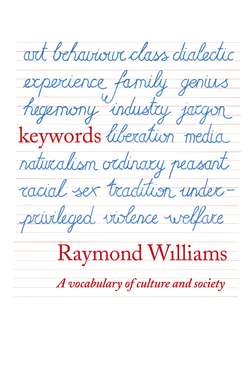Читать книгу Keywords: A Vocabulary of Culture and Society - Raymond Williams - Страница 24
CITY
ОглавлениеCity has existed in English since C13, but its distinctive modern use to indicate a large or very large town, and its consequent use to distinguish urban areas from rural areas or country, date from C16. The later indication and distinction are obviously related to the increasing importance of urban life from C16 onwards, but until C19 this was often specialized to the capital city, London. The more general use corresponds to the rapid development of urban living during the Industrial Revolution, which made England by mC19 the first society in the history of the world in which a majority of the population lived in towns.
City is derived from fw cité, oF, rw civitas, L. But civitas was not city in the modern sense; that was urbs, L. Civitas was the general noun derived from civis, L – citizen, which is nearer our modern sense of a ‘national’. Civitas was then the body of citizens rather than a particular settlement or type of settlement. It was so applied by Roman writers to the tribes of Gaul. In a long and complicated development civitas and the words derived from it became specialized to the chief town of such a state, and in ecclesiastical use to the cathedral town. The earlier English words had been borough, fw burh, oE and town, fw tun, oE. Town developed from its original sense of an enclosure or yard to a group of buildings in such an enclosure (as which it survives in some modern village and village-division names) to the beginnings of its modern sense in C13. Borough and city became often interchangeable, and there are various legal distinctions between them in different periods and types of medieval and post-medieval government. One such distinction of city, from C16, was the presence of a cathedral, and this is still residually though now wrongly asserted. When city began to be distinguished from town in terms of size, mainly from C19 but with precedents in relation to the predominance of London from C16, each was still administratively a borough, and this word became specialized to a form of local government or administration. From C13 city became in any case a more dignifying word than town; it was often thus used of Biblical villages, or to indicate an ideal or significant settlement. More generally, by C16 city was in regular use for London, and in C17 city and country contrasts were very common. City in the specialized sense of a financial and commercial centre, derived from actual location in the City of London, was widely used from eC18, when this financial and commercial activity notably expanded.
The city as a really distinctive order of settlement, implying a whole different way of life, is not fully established, with its modern implications, until eC19, though the idea has a very long history, from Renaissance and even Classical thought. The modern emphasis can be traced in the word, in the increasing abstraction of city as an adjective from particular places or particular administrative forms, and in the increasing generalization of descriptions of large-scale modern urban living. The modern city of millions of inhabitants is thus generally if indefinitely distinguished from several kinds of city – cf. cathedral city, university city, provincial city – characteristic of earlier periods and types of settlement. At the same time the modern city has been subdivided, as in the increasing contemporary use of inner city, a term made necessary by the changing status of suburb. This had been, from C17, an outer and inferior area, and the sense survives in some uses of suburban to indicate narrowness. But from lC19 there was a class shift in areas of preference; the suburbs attracted residents and the inner city was then often left to offices, shops and the poor.
See COUNTRY, CIVILIZATION
